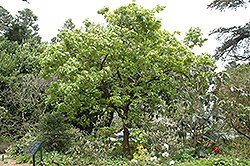It's all about ...
plants

Height: 60 feet
Spread: 60 feet
Sunlight:
![]()
Hardiness Zone: 6b
Other Names: Daimio Oak
Description:
This regal shade tree, with its picturesque rounded habit of growth and far reaching branches, is best for larger landscapes; leaves are the largest of the oak species; relatively fast growing; in early years it has a shrublike habit,
Ornamental Features
Japanese Emperor Oak has dark green deciduous foliage on a tree with a round habit of growth. The large glossy lobed leaves turn brown in fall. However, the fruit can be messy in the landscape and may require occasional clean-up. The furrowed tan bark adds an interesting dimension to the landscape.
Landscape Attributes
Japanese Emperor Oak is a dense deciduous tree with a more or less rounded form. Its relatively coarse texture can be used to stand it apart from other landscape plants with finer foliage.
This tree will require occasional maintenance and upkeep, and is best pruned in late winter once the threat of extreme cold has passed. It is a good choice for attracting squirrels to your yard. Gardeners should be aware of the following characteristic(s) that may warrant special consideration;
- Messy
Japanese Emperor Oak is recommended for the following landscape applications;
- Shade
- Vertical Accent
Planting & Growing
Japanese Emperor Oak will grow to be about 60 feet tall at maturity, with a spread of 60 feet. It has a high canopy of foliage that sits well above the ground, and should not be planted underneath power lines. As it matures, the lower branches of this tree can be strategically removed to create a high enough canopy to support unobstructed human traffic underneath. It grows at a fast rate, and under ideal conditions can be expected to live to a ripe old age of 300 years or more; think of this as a heritage tree for future generations!
This tree should only be grown in full sunlight. It is very adaptable to both dry and moist growing conditions, but will not tolerate any standing water. It is not particular as to soil type or pH. It is somewhat tolerant of urban pollution. This species is not originally from North America.
This plant is not reliably hardy in our region, and certain restrictions may apply; contact the store for more information.
